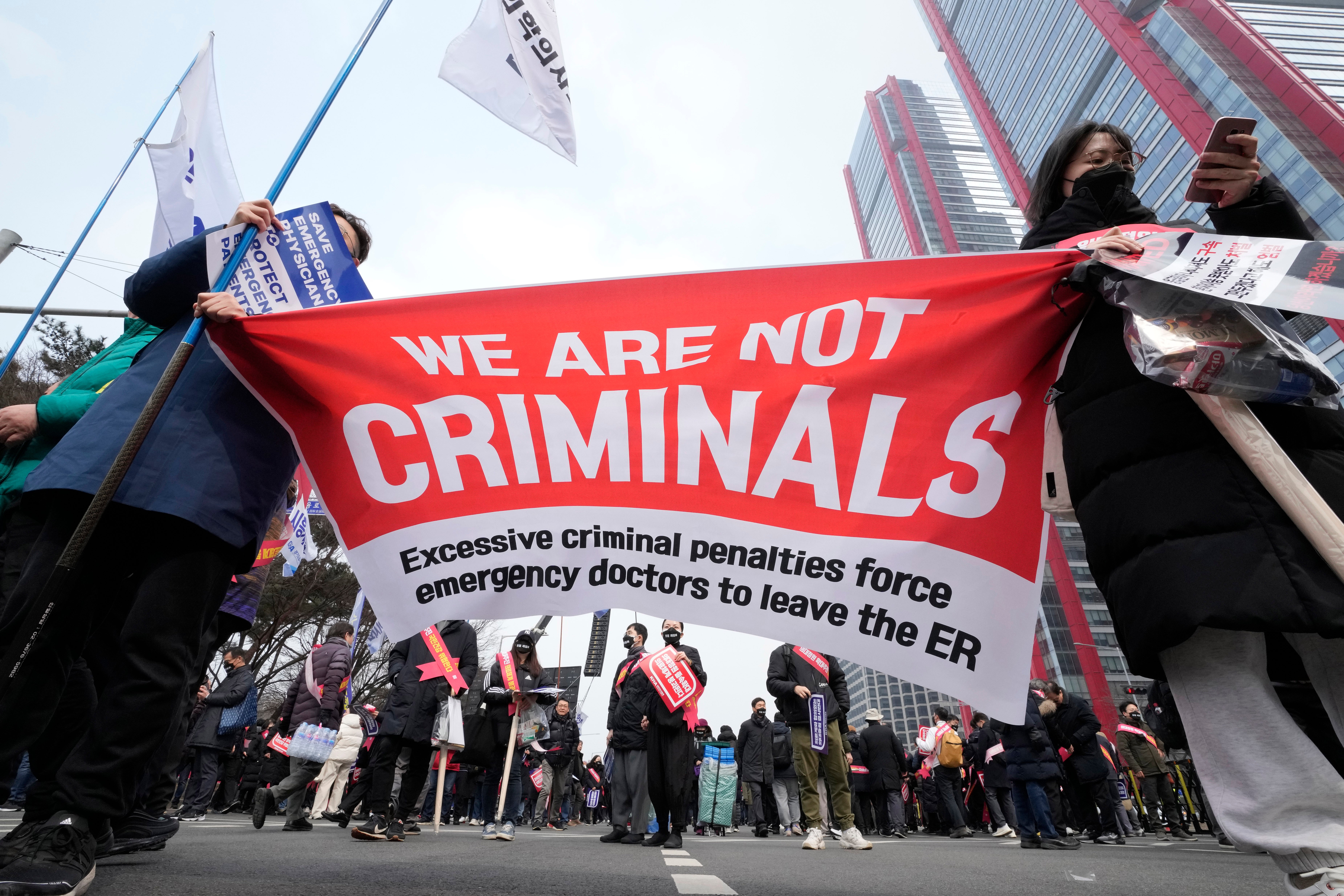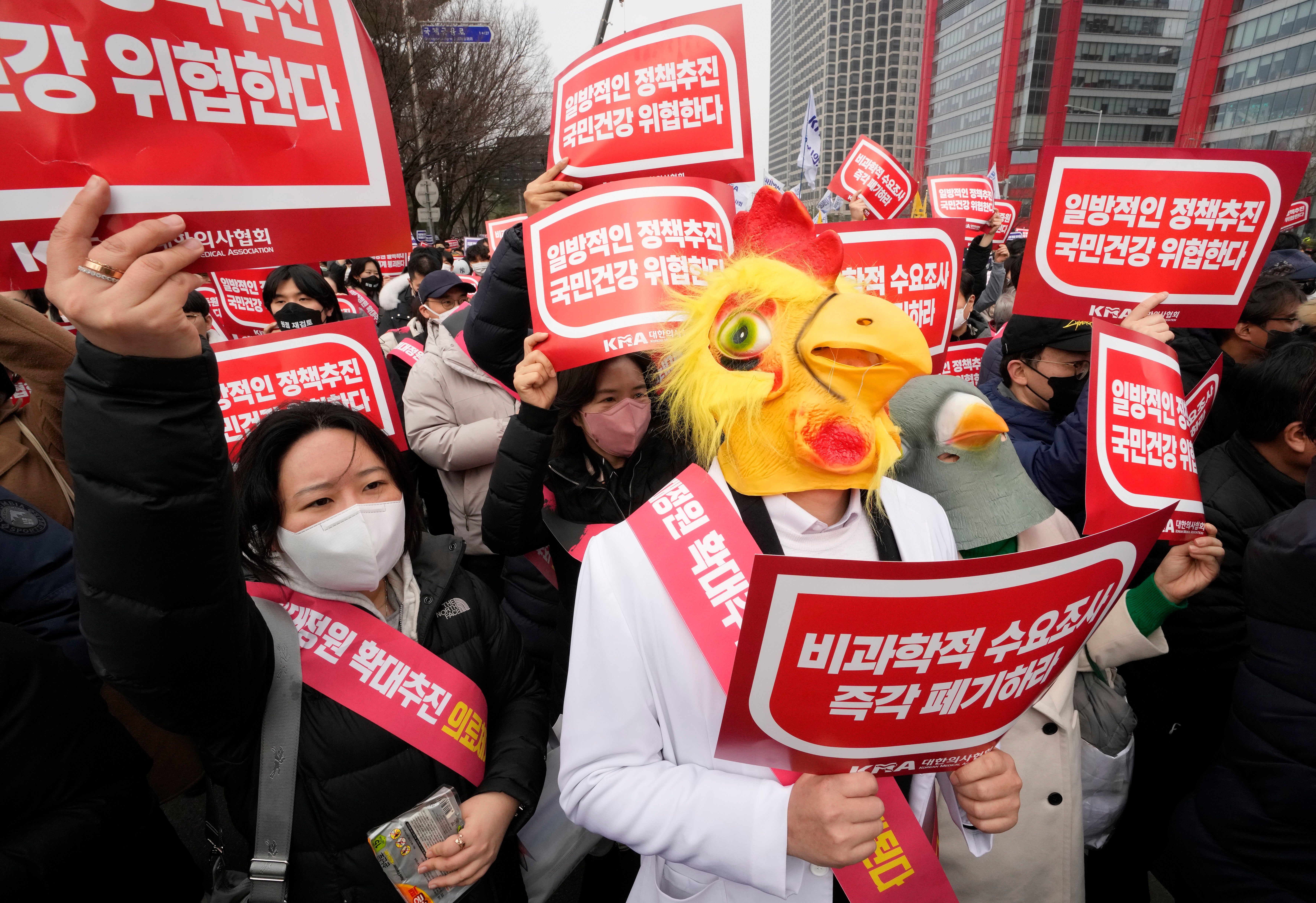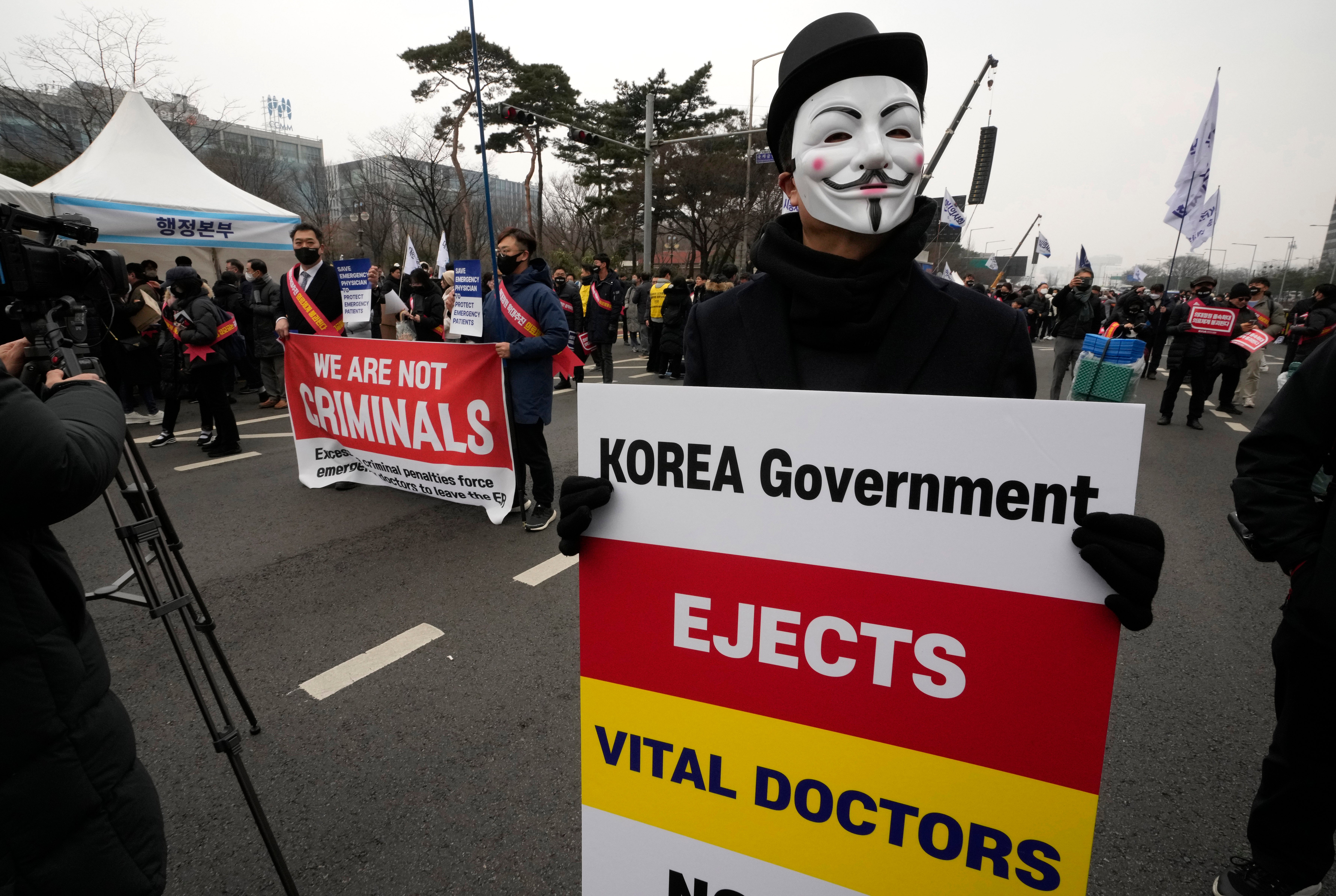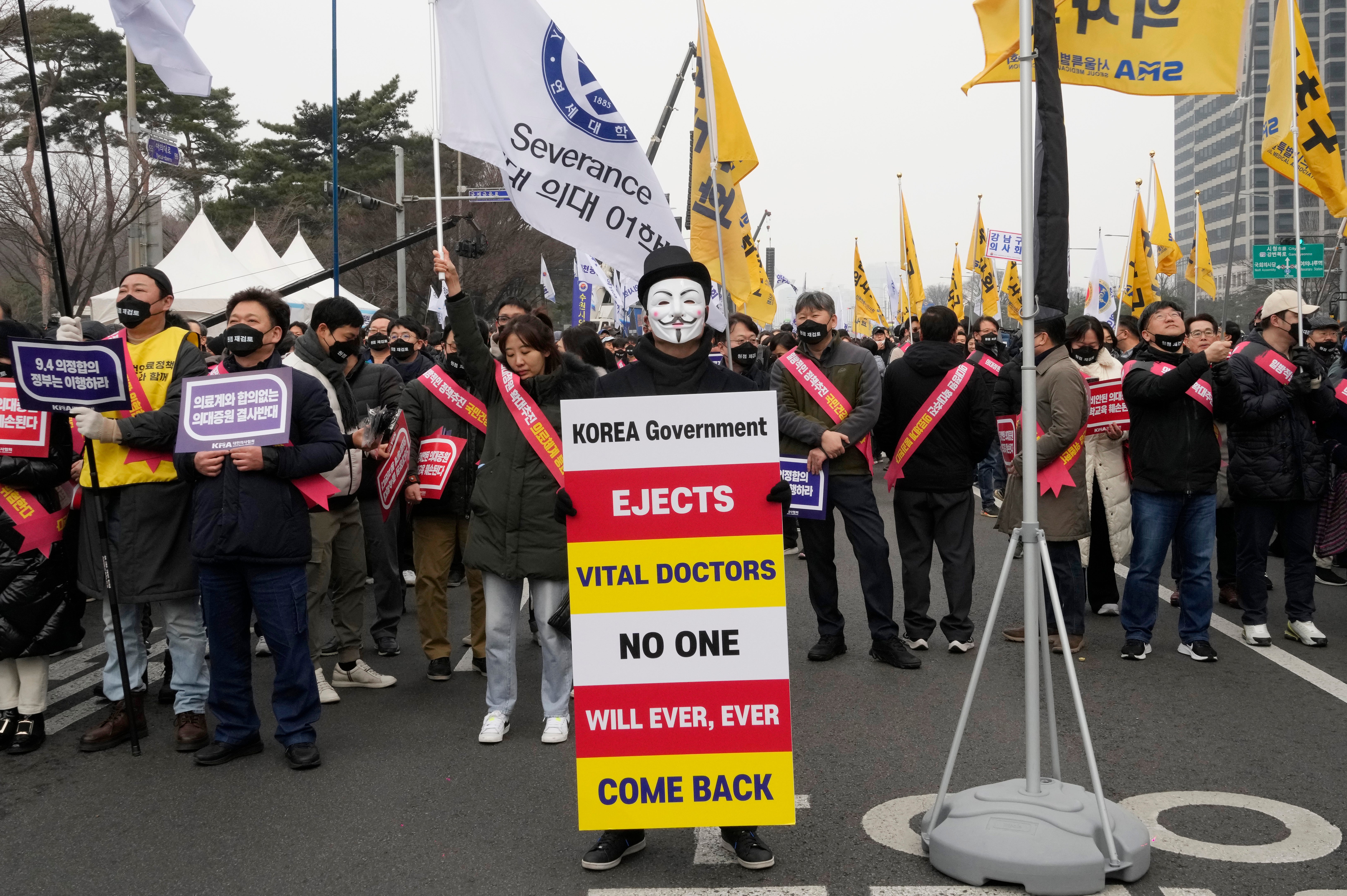Why South Korea’s doctors are refusing to see patients
Government previously warned striking doctors of potential legal consequences
Your support helps us to tell the story
From reproductive rights to climate change to Big Tech, The Independent is on the ground when the story is developing. Whether it's investigating the financials of Elon Musk's pro-Trump PAC or producing our latest documentary, 'The A Word', which shines a light on the American women fighting for reproductive rights, we know how important it is to parse out the facts from the messaging.
At such a critical moment in US history, we need reporters on the ground. Your donation allows us to keep sending journalists to speak to both sides of the story.
The Independent is trusted by Americans across the entire political spectrum. And unlike many other quality news outlets, we choose not to lock Americans out of our reporting and analysis with paywalls. We believe quality journalism should be available to everyone, paid for by those who can afford it.
Your support makes all the difference.The resignation of thousands of striking junior and trainee doctors in South Korea in response to a government initiative to increase medical student admissions has left the healthcare system in disarray.
The government said on Monday it was ready to take legal action against the striking trainee doctors after a prior ultimatum failed to break the deadlock.
About 70 per cent of the country’s junior and trainee doctors, totalling around 9,000, have been on strike since 20 February, disrupting medical services and emergency departments.
South Korea has one of the lowest doctor-to-patient ratios among major economies and recently the government proposed to add 2,000 slots to the current annual quota of 3,000 medical students.
The plan was immediately criticised by doctors, who took to the streets to protest with signs that read “end of healthcare.” The striking doctors argue this expansion won’t solve the actual shortages in certain specialities, where conditions and pay are poor, and could degrade medical service quality.
The government had previously warned the doctors of potential administrative and legal consequences, including the possibility of having their medical licenses suspended, and facing fines or imprisonment if they did not return to work by the end of last month.
On Monday, health minister Cho Kyoo-hong announced that officials will conduct hospital inspections to ascertain if doctors have resumed their duties, vowing to enforce the law and “take action according to the law and principle without exception”.
During a broadcasted briefing, he warned that doctors who have not returned to work could face significant repercussions affecting their professional careers.
“We are deeply disappointed and concerned that the collective action by trainee doctors has led to a disruption in medical services,” vice health minister Park Min-soo said at a news briefing recently.
“We cannot give justification to the actions of the doctors leaving their patients behind to protest a policy despite knowing what the collective action could result in.” He added that the government was “deeply disappointed in the situation where trainee doctors are refusing to work”.
The government had asked doctors to return to work, issuing direct orders and threatening legal actions against those leading the strike. In fact, emergency measures to mitigate the impact on healthcare services have been introduced, including telemedicine expansion and the utilisation of military hospitals. South Korea’s health ministry announced it will permit telemedicine services across all hospitals and clinics to address the challenges posed by the walkout by trainee doctors.
“The medical system has been collapsing for a while,” Park Dan, the head of the Korean Intern Residents Association told The New York Times. He resigned from his job at the emergency wing of Severance Hospital in Seoul on Monday. “I couldn’t see a future for myself working in emergency for the next five or 10 years.”
Doctors warned the government they will take “unbearable” steps and could walk off the job indefinitely if the government continues to threaten interns and residents opposing its plan, according to The Korea Times.
Earlier, South Korea escalated its health alert to the highest level in response to the widespread strike. The prime minister also announced that public hospitals would increase their operational hours to tackle the increasing pressures on the healthcare infrastructure.

The Korea Medical Association (KMA), representing the majority of doctors in South Korea, made the statement after the ruling People Power Party (PPP) said they’ll take strict action against striking doctors.
“We express strong regret over the government’s inappropriate comments threatening to revoke licenses and discouraging the individual’s will to voluntarily step down as a trainee doctor,” the KMA’s emergency committee said.
“If they continue to intimidate, we warn that we could seek legal action,” the committee added.
On Sunday, thousands of South Korean doctors participated in a large-scale demonstration organised by the Korean Medical Association [KMA], which speaks for private practitioners, openly challenging government demands for striking trainee doctors to resume their duties.
“We have nowhere to retreat any more. We will not just sit idly by the government acting undemocratic,” Lee Jeong-geun, the interim head of the KMA, said on Sunday.
Kim Taek-woo, head of the KMA emergency committee, told reportersearlier: “By collection action, we don’t mean a day off, but an indefinite strike.”
A proposal in 2020 to increase medical school admissions by 4,000 students over a decade sparked similar protests and a strike, ultimately resulting in the abandonment of the plan.
According to 2022 data from the Organisation for Economic Co-operation and Development [OECD], doctors in South Korea are among the highest earners globally, with specialists at public hospitals averaging nearly $200,000 (£159,000) annually. This salary significantly surpasses the national average income.
However, some have also criticised the striking doctors. “More doctors mean more competition and reduced income for them... that is why they are against the proposal to increase physician supply,” Prof Kwon Soon-man, a public health expert at Seoul National University told BBC.

South Korea’s president Yoon Suk-yeol asked the doctors to go back to their jobs and said that they were “taking people’s lives and health hostage”.
The plan to boost admissions to medical schools is a component of a broader health care policy strategy unveiled by Mr Yoon several months ahead of an important parliamentary vote in April. As he has maintained his position against the medical professionals, his approval rating has slightly risen.
Public opinion in South Korea appears largely supportive of the government’s plan, contrasting with the medical community’s concerns over the implications for healthcare quality and working conditions.
A Gallup Korea poll last week revealed that 76 per cent of the respondents reacted positively to the government’s plan for medical school quota expansion.
Observers note that the existing structure of insurance and government reimbursements enables only doctors in certain fields, such as cosmetic surgery, to earn a substantial income. Moreover, the doctors opposing the government’s plan argue that boosting the number of medical professionals could inadvertently foster increased competition, potentially resulting in the overtreatment of patients.
Authorities have temporarily revoked the medical licenses of two high-ranking officials from the Korea Medical Association. They have reportedly been warned that these licenses will be permanently revoked if investigations confirm they incited the strike.
Police have also indicated they might arrest the strike’s organisers.
“We are considering measures that involve cooperating with prosecutors to indict and arrest the leaders of the medical community who are responsible for the mass resignations,” Yoon Hee-keun, the commissioner general of the Korean National Police Agency, said during a press conference.

Earlier this week, reports of disruptions in medical services across the country were being shared widely, with Severance Hospital, among the nation’s largest healthcare facilities, announcing reductions in services and the cancellation of half of its scheduled surgeries.
Hong Jae-ryun, a brain cancer patient in his 50s from Daegu, reported that his chemotherapy treatments have been indefinitely delayed due to the ongoing situation, despite the cancer spreading to his lungs and liver.
“It’s absurd. In the midst of the conflict between the government and doctors, what can powerless patients say? It feels like a betrayal,” Mr Hong was quoted as saying by AFP.
“When there is no one to trust and rely on other than doctors, it seems excessive to handle things in this manner.”
Another patient, Lee Jin-wook, 52, who is scheduled to undergo brain surgery at Severance Hospital’s Sinchon location told Hankyoreh Shimbun: “All around the ward, patients and their families are talking about surgeries being delayed.
“It looks like they’re pushing back all non-essential operations.”
It is particularly troubling for patients who live outside Seoul and regularly travel to the capital for treatment. “Originally, we scheduled an operation for the beginning of March. But the strike has pushed that back to the end of March,” one person identified as Cho, 44, a resident of Gyeongju, North Gyeongsang Province told The Korea Times. Cho’s father is being treated for esophageal cancer at Gangnam Severance Hospital.
“We tried contacting other hospitals, as my father needs his operation as soon as possible, but they all turned us down,” Mr Cho added.
“My father managed to get his first session of checkup today, but the operation schedule really concerns me. The patients really have no choice or power,” he said.
Physicians from Gyeonggi province gathered for a demonstration in central Seoul. They wore red headbands bearing the message “(We) fiercely oppose the expansion of medical school admissions” and displayed banners with the words “Stop populist healthcare policies pushed by socialist leftist scholars and bureaucrats”.
Hankyoreh Shimbun quoted a Severance Hospital insider as saying that “emergency surgeries [at hospitals in Sinchon and Gangnam] are being conducted as normal, but surgeries in other departments are under 50 per cent capacity”.
Meanwhile, it is the nurses who have been left to manage the patients at the hospitals and clinics in the absence of doctors. They too have called for doctors to resume their duties, despite expressing their opposition to the reform.

The Korean Young Nurses Association appealed to doctors’ sense of duty to their patients in a social media post stating: “Do not ignore your conscience toward the patients being left behind.”
Kim Jae-heon, the secretary-general of a non-profit organisation that promotes free medical care and counts medical doctors among its members, criticised the mass resignation of trainee doctors as unjustified.
“Opposing the expansion of medical school admissions to ensure greater profitability by reducing competition when they establish their own practices in the future is unlikely to garner public support,” he said.
Joo Soo-ho, a spokesman of the Korean Medical Association, said last month that under current conditions, it was “impossible for doctors to take care of patients with a sense of mission”.
The World Medical Association, a group representing physicians, said in a statement on Sunday it “strongly condemns the actions of the Korean Government in attempting to stifle the voices of elected leaders within the Korean Medical Association,” adding it affirmed the right of doctors to collective action, including strikes.
The Independent has reached out to the Korea Medical Association for comment.

Join our commenting forum
Join thought-provoking conversations, follow other Independent readers and see their replies
Comments